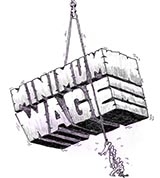
Harder than it appears
Minimum Wage, Maximum Rage
It sounds so obvious: every person in gainful employment should earn enough to live in dignity, meaning that the lowest-earners should never fall below the poverty line. In other words, they ought to earn at least a minimum wage. Even Germany, a long-time holdout, caved in and introduced a minimum wage a couple of years ago. The unions duly cheered and business groaned.
According to a new CESifo study by George Economides and Thomas Moutos, they should all be groaning instead. It is not only that minimum wages have time and again been shown to help some workers earn more at the cost of the low-skilled losing their jobs, as another CESifo study prognosticated back in 2009 and as the realities of internships in Germany show today. Under real-life conditions, they actually fail to raise after-tax incomes of workers.
Messrs Economides and Moutos start by pointing out that, whatever the criticism or support voiced by economists regarding the effects of minimum wages, they all agree that when such wages are raised the incomes of at least some workers who remain in employment will be higher. This presumption, however, is by no means guaranteed when you allow for capital accumulation.
To demonstrate this, they construct a model with two types of agents: workers, who don’t save and are differentiated according to their ability, and capitalists, who don’t work but do all the saving and own the capital stock. Running the data through their model, they show that the imposition of any binding minimum wage, in addition to generating unemployment amongst the least able workers, also reduces both capital stock and after-tax income of employed workers.
This implies that the joint existence of economic profits and differences in ability among workers can allow those above an ability threshold to increase their after-tax incomes through the imposition of a binding minimum wage, but only at the expense of low-ability workers who become unemployed.
The authors then extend the model by allowing for heterogeneity in the amount of labour offered by workers of different ability. Their numerical comparisons of the long-run properties of the perfectly competitive and the minimum-wage regimes indicate that it is impossible under any set of plausible parameters to increase the incomes of employed workers under constant returns to scale even when no welfare support is provided to the unemployed. Even under decreasing returns to scale it is impossible to increase the after-tax income of employed workers unless the unemployed are left with a level of welfare support far below what they would earn in the absence of minimum wages.
When the authors refrain from using two distinct groups of agents and stick only to worker heterogeneity, the findings are similar: they demonstrate that it is impossible for the imposition of minimum wages to increase employed workers’ total income when there are constant returns to scale, and that when there are diminishing returns to scale, the only possibility for the imposition of minimum wages to increase employed workers’ total income arises when the increase in after-tax wage income outweighs the loss of their other sources of income (capital income and dividends). After extensive experimentation with a wide range of plausible parameter values, the authors are unable to find a single case in which the total income of employed workers increases even when no welfare support in provided to the unemployed. In other words, the presence of another economic class (the capitalists) is necessary for employed workers to be better off from the imposition of minimum wages. Roll over, Marx.
As the saying goes, the road to hell is paved with good intentions. Those do-gooders rooting for the imposition or increase of minimum wages should think twice.
George Economides and Thomas Moutos, Can Minimum Wages Raise Workers’ Incomes in the Long Run? CESifo Working Paper No. 5913
Other CESifo Working Papers by George Economides
Other CESifo Working Papers by Thomas Moutos
Other CESifo Working Papers dealing with minimum wages
